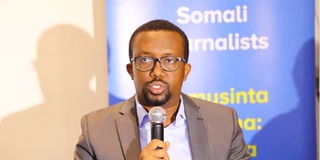African Union pushes for media safety in Somalia peace

Omar Faruk Osman, Secretary-General of NUSOJ.
The African Union Transition Mission in Somalia (ATMIS) is pushing for free media in the country as a good warning tool for future breaches in peace and security.
The Mission is supposed to prepare the ground for Somalia’s own security and other institutions to run the country from end of next year. But the Mission’s officials say free and independent media can help point out weaknesses that would otherwise boil to a full blown conflict.
“Media professionals have always played an important role in early warning, crisis response and post-conflict interventions. They can effectively contribute to conflict prevention, management and resolution,” Fiona Lortan, the Deputy Special Representative of the Chairperson of the African Union Commission (DSRCC) in Somalia, told a forum in Mogadishu on Monday.
And according to ATMIS, having free media in Somalia is part of a wider continental policy of ‘silencing the guns’, a vision where civil wars and other forms of violence are to end. Ms Lortan says African countries like Somalia should implement the policy by ensuring political commitment to eradicate triggers of conflict
“This places governance at the heart of efforts to address and end conflicts on the continent, and therefore also places the right to information and freedom of expression at the heart of peace and security efforts,” Ms Lortan added.
She spoke as Somalia’s journalists adopted a National Action Plan to push for safety of media workers and tame what they called the culture of intimidation and different forms of violence targeting journalists.
The Plan, a product of a three-day forum organised by the National Union for Somali Journalists (NUSOJ) and supported by ATMIS and United Nations Educational, Scientific and Cultural Organization (UNESCO), is a platform where the government, media outlets, journalists and other stakeholders commit to media freedom and protection of journalists.
Somalia is still the worst country in the region to work as a journalist, according to Reporters Without Borders (RSF). But journalists are often threatened by both government operatives and members of the terrorist group al-Shabaab, which ATMIS has been fighting for the last 13 years (initially known as the African Union Mission in Somalia [Amisom]).
NUSOJ said the Plan will help reduce incidents of attacks on journalists, and improve working environment especially for female reporters.
“Our drive for safe journalism is action oriented, journalists-centred, conscious of local realities and conforms to global standards, while also fulfilling international obligations in defending media freedom,” said Omar Faruk Osman, Secretary-General of NUSOJ.
“Women journalists have unique safety concerns that need to be addressed if the goal of a peaceful Somalia in which all citizens enjoy their rights without obstruction, and without the risk of retribution is to be met,” he added.
The three-day forum heard of a poor working environment for journalists, harassment, physical harm, hacking, blackmailing and intimidation journalists in Somalia face.
Ms Amal Hassan, a female journalist working in Mogadishu, told of how female are especially harassed while covering events like demonstrations or even speaking to sources.
“As women, we need to perform our work freely without discrimination, just like our male counterparts,” she told the gathering whose speakers also included representatives from the UNESCO and the International Labour Organisation (ILO).
UNESCO's Regional Communication and Information Advisor, Misako Ito, said media freedom safety can indicate how a country runs by rule of law.
"The safety of journalists and the issue of impunity require a solution that is of much greater impact, and able to bring different stakeholders with different expertise, resources, network and interest to put a positive change."
In spite of the dangers they face, Somali journalists hope the new government of President Hassan Sheikh Mohamud can remedy their situation.
Somalia Federal Minister for Internal Security, Dr Mohamed Ahmed Sheikh Ali told the forum the government will respect freedom of speech.
“Media freedom is key to a Somalia that is at peace,” he said.
“Our constitution guarantees media freedom and right to expression and safety. Citizens have the right to express their opinions, and to do so responsibly,” said Dr Mohamed.
The Plan will require legal remedies but will also mean stakeholders must address physical protection of journalists, mental health care, technological awareness and policies to address gender based violence.





